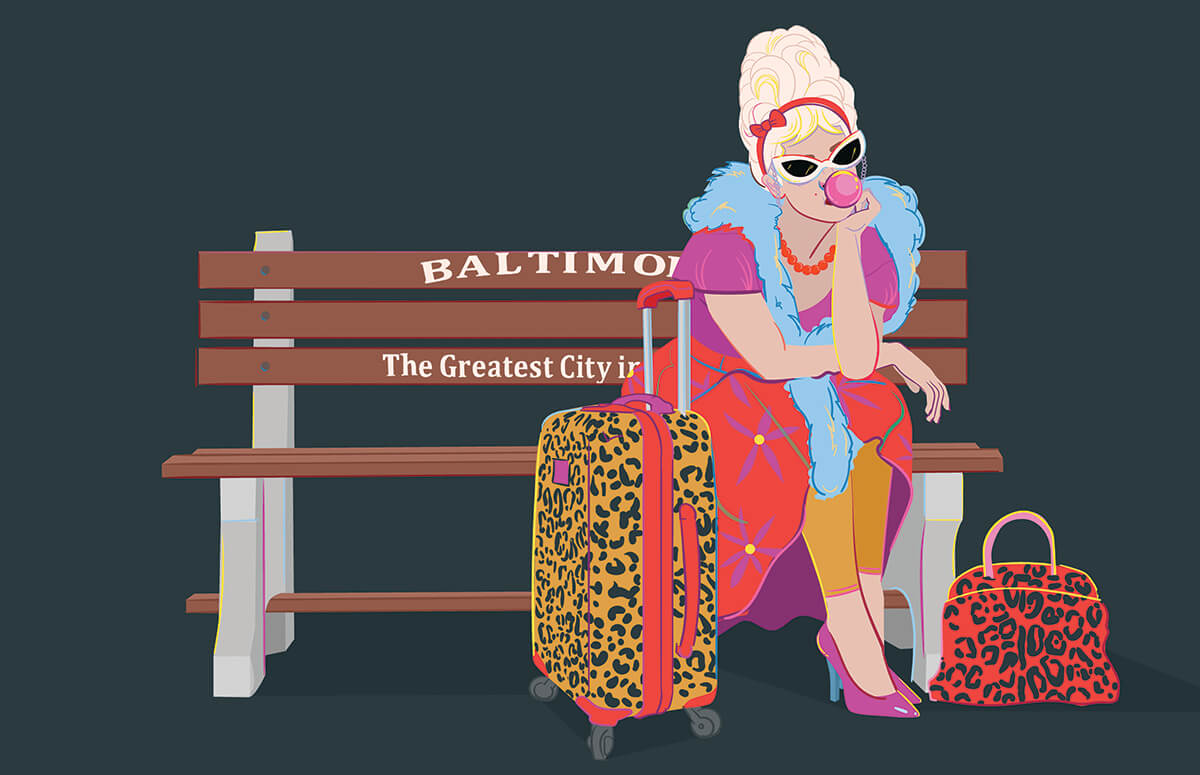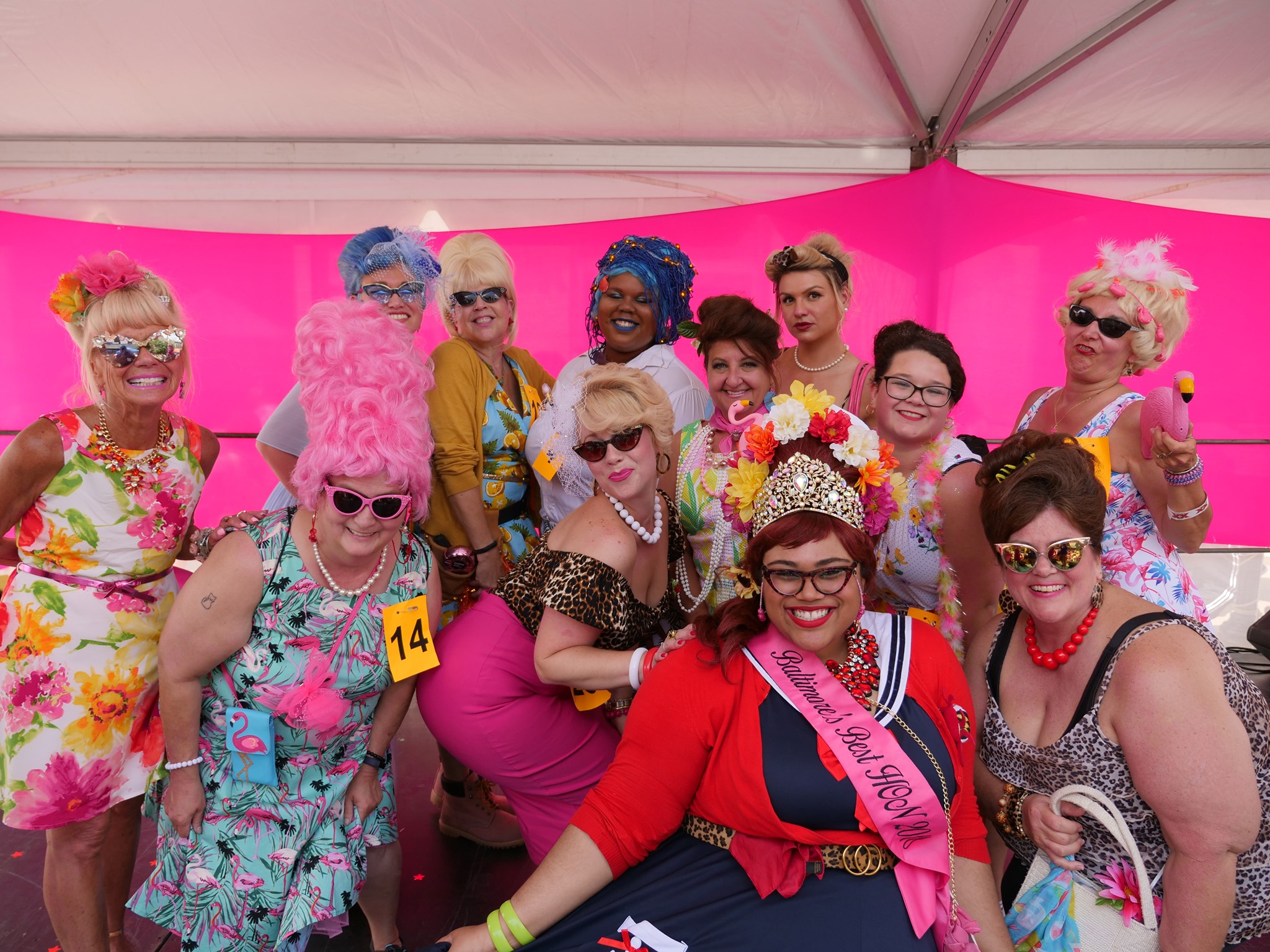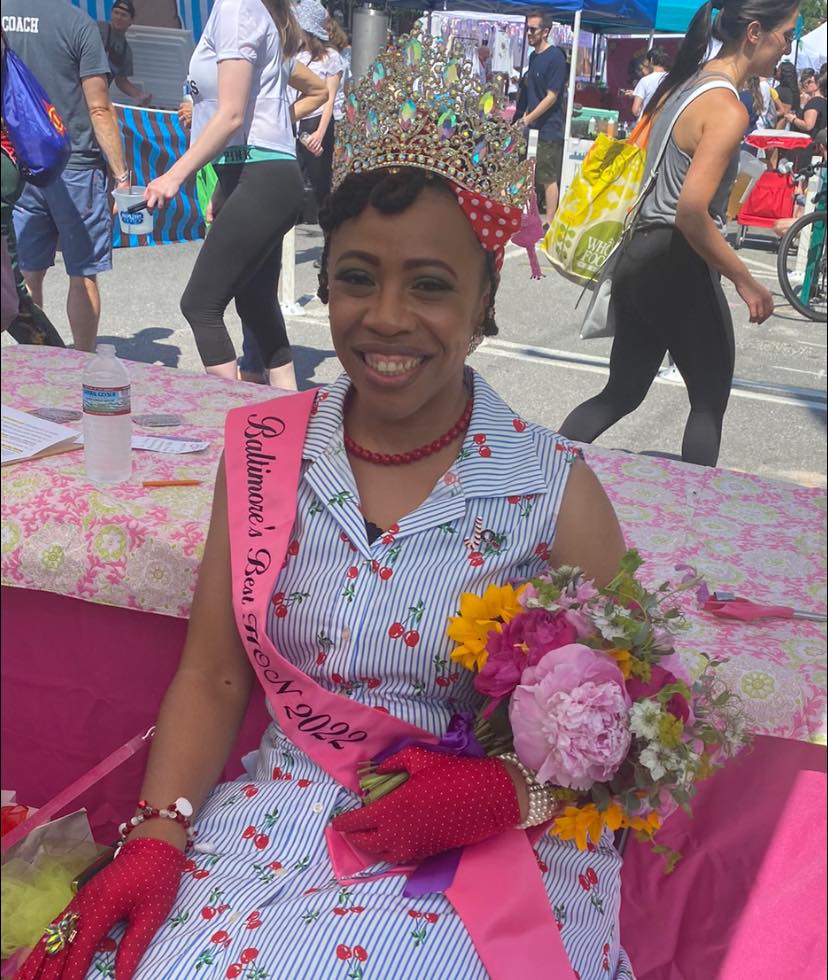News & Community
Can HonFest, Hampden’s Homage to Working Women, Find a Joyful and Inclusive Way Forward?
Not everyone is enamored with an event that seemingly celebrates a white culture in a neighborhood that was once an enclave for white, blue-collar Baltimoreans.

Fluff up the feather boa. Locate the leopard-print pants. Pull out the poodle skirt. It’s time for HonFest, when thousands of visitors descend upon Hampden for two days in June to dress up as Baltimore’s favorite icon—the Hon—and pay tribute to working-class women of an earlier era.
Supporters love the glamour of wannabe Hons as they parade along 36th Street in colorful attire, some preparing to enter Baltimore’s Best Hon contest—this year’s 30th pageant—with others just enjoying a chance to put on a costume of sorts.
Bonnie Hockstein—Hon name: Bonnie Marie Shiksakowski—saw HonFest on TV in the late ’90s and knew she wanted to be there. Her mother, Dorothy “Poopsie” Bucci, was the epitome of the women being celebrated. Bucci, who passed away in 2020, had been a longtime waitress at celebrated restaurants of yore like Haussner’s and Obrycki’s and later worked at the Dundalk crab house Ruggiero’s until she was 80.
“I wore her waitress outfit,” Hockstein says. “I did it as an homage to my mom.”
Hockstein, who now organizes the main-stage entertainment for the festival, being held June 10 and 11 this year, sees HonFest as a celebration of the women who worked at service jobs like cleaning houses and waitressing while their husbands and boyfriends served in World War II and the Korean War. If they had kids at home, the women would take in laundry and sewing for some extra income.
“My mother would call it ‘go-to-hell money,’” Hockstein says. “It was the beginning of women’s liberation.”

But not everyone is enamored with an event that seemingly celebrates a white culture in a neighborhood that was once an enclave for white, blue-collar Baltimoreans. Even Baltimore’s beloved “Pope of Trash” John Waters has dismissed the Hon culture that he helped to popularize, telling The Baltimore Sun in 2008 that “it’s used up” and “condescending now.”
At one time, Waters incorporated the Hon image in some of his movies, most notably in his 1988 film Hairspray. The original movie, which later became a musical and then a film again, featured teens and women of the early ’60s wearing exaggerated beehive and bouffant hairstyles. In the movie, the late Baltimore star Divine played the larger-than-life character Edna Turnblad, who delivered the line, “Fetch me my diet pills, would you, hon?”
Over the years, “hon,” a shortened version of the endearment “honey,” has secured a place in Baltimore’s lexicon.
“You used ‘hon’ because you didn’t know everyone’s name,” Hockstein says.
With the right accent, it’s pure Bawlmerese, a dialect that originated among the city’s white, blue-collar residents. Whatever its pronunciation, Waters told The Sun that he’s done with the word and the Hon image: “I used to say, ‘Come to Baltimore and you would see people with those hairdos.’ You no longer see that. They’re dead or in nursing homes.” The years haven’t softened his stance. When asked recently about the Hons, he said, through an assistant, that he feels like he’s already shared his opinion about the Hon phenomenon and has nothing fresh to add.
The Hons are also in a bit of a tussle with Waters. “He thinks we’re appropriating his characters. We think he’s appropriating our characters,” Hockstein says. “We go back and forth. It has never been settled.”
David Puglia, who wrote Tradition, Urban Identity, and the Baltimore “Hon”: The Folk in the City (Lexington Books, 2018), sees Hon folklore as a way for people to have meaning in their lives and create a group identity.
“It arises to meet an inferiority complex,” he says. “Baltimore, in my opinion, is often in the shadows of New York and Washington, D.C. It used to be one of the United States’ major cities. Perhaps not anymore, and so because of that, there appears to be in the celebration of Hon culture a way of calling attention to what makes Baltimore distinct or special.”
HonFest started benignly enough in 1994 when Denise Whiting, owner of the now-closed Cafe Hon, held a small pageant to find Baltimore’s Best Hon during Hampden’s annual Summer Fair. There were six contestants. “I always loved beauty contests,” Whiting explains. “The whole Hon thing harkens back to a softer time. It’s all those good, solid memories you have of growing up and watching your grandmothers and aunts.”
Whiting was also following, as many Baltimoreans were at the time, the escapades of a mysterious man dubbed “The Hon Man,” who would hang a sign saying “Hon” next to the “Welcome to Baltimore” sign on the Baltimore-Washington Parkway, so it would greet motorists with “Welcome to Baltimore, Hon.”
Some officials and residents took offense, complaining that the moniker was patronizing to women as well as exclusionary to Black people. Others, like Sun columnist Dan Rodricks, supported Hon Man’s gesture. So did Whiting. “I did a petition to leave it up,” she says. She also put the word “Hon” on coffee mugs and had them delivered to Maryland elected officials. “It was something to talk about,” she says. “It was fun. It was celebrated.”
“THE WHOLE HON THING HARKENS BACK TO A SOFTER TIME.”
In 1996, Whiting, 64, parted ways with the Hampden Summer Fair, which folded the following year, and moved her festivities to Cafe Hon’s back parking lot, branding it HonFest. By 2002, the festival, which was drawing more visitors each year, spread out to Hampden’s main street—36th Street, or The Avenue as it’s known—to accommodate the hordes of people.
Whiting received a lot of support over the years. When city inspectors badgered her to pay a hefty fee to keep the 30-foot pink-flamingo structure on her restaurant building, Baltimore citizens rallied around her in 2009, organizing a protest by staking smaller plastic pink flamingos in the ground at War Memorial Plaza. While John Waters titled his 1972 movie Pink Flamingos, the signature Baltimore lawn ornaments became popular years earlier. Instead of going to Ocean City to vacation, the newly working women of the mid-20th century would use their extra money to go to Florida, bringing back as many plastic birds as they could. They put them in their yards, so neighbors would know they could afford to visit the Sunshine State, Hockstein says.
While Whiting got to keep her giant flamingo, she had another idea that didn’t endear herself to many Baltimoreans. She trademarked the word “Hon,” planning to use the term to her commercial advantage. When word got out in 2010, protestors marched outside Cafe Hon. The restaurant’s business dropped 20 to 25 percent, according to a Sun article. British celebrity chef Gordon Ramsay showed up with his Kitchen Nightmares crew, embarking on a redo of the troubled Cafe Hon and Whiting’s reputation. Whiting eventually offered a teary apology on MIX 106.5 FM and gave up her trademark in 2011. She acknowledged at the time, “Trademarking the word has not only almost killed me but has just about killed the business.”
Despite the unsettling hiccup, HonFest continued that year without repercussions. And even Cafe Hon’s closure in April 2022 hasn’t deterred the annual ode to Hons from proceeding.
“I didn’t realize HonFest was going to happen even though Cafe Hon is gone,” says Mary Rizzo, author of Come and Be Shocked: Baltimore Beyond John Waters and The Wire (Johns Hopkins University Press, 2020). “At first, I found HonFest really fascinating because of the contradictions that it represented. I loved the kitschiness and campiness of the people dressing up like Hons and competing.”
But Rizzo, who started going to HonFest in 1999 when she was working on her dissertation about class identity in the United States and how people mold their class identity through clothes and fashion, also found the concept more complicated.
“This was a neighborhood going through a transition, a demographic transition that you might call gentrification,” she says. “As working-class people were being pushed out or were leaving the neighborhood or were passing away, they were being replaced by middle-class and upper-class people, who were then taking on the sort of costume of the working class.”
Rizzo says today’s working-class people in Baltimore don’t fit the typical image of the Hon of the past since Baltimore is not a majority-white city anymore.
“There have been changes to who competes for the Best Hon title and who participates in HonFest,” she says.
Baltimore rapper, songwriter, and philanthropist Anthony Parker—aka Wordsmith—never expected to perform at HonFest in Hampden.
“I never felt like it was a festival where I would be wanted or that I would want to go to,” he says. “Prior years, the Black community has not been represented.”
But this year, the hip-hop artist, who is also an artistic partner with the Baltimore Symphony Orchestra, is looking forward to taking the stage on June 11. It will be his first visit to the community, thanks to the efforts of Hockstein and HonFest emcee Judy Templeton to make HonFest more inclusive.
“They see that there’s been a void for years in inviting the Black community, and not just the Black community but all of Baltimore to feel welcome to HonFest,” says Wordsmith, 43, who has lived in Baltimore for 25 years. “I see two women who want to do the right thing. They see where we are in America right now, and they’re trying to do what they can to open people’s eyes.”
Hockstein, who doesn’t want to reveal her age, and Templeton, who gives her age as “timeless,” have been working steadily to broaden the festival’s reach.
“When we talked to Black men and women in the community, it turned out they were afraid to come to Hampden because it still had a white feeling that they didn’t necessarily feel a part of,” Templeton says. “We want to start changing that.”
She also realized that the festival had a stereotype of being about only white women. “But women who contributed in Baltimore were many different races and had their own stories,” she says.
Templeton, who grew up in a rowhouse on the west side of Baltimore, attended her first HonFest more than a decade ago and found herself in the Best Hon contest that day. She made it to the top 10 but didn’t win, though she was later picked Baltimore’s Best Hon 2021. HonFest founder Whiting named Templeton and Hockstein, crowned Best Hon 2020, as reigning title holders while the event was on hiatus during the pandemic. “We both share an extreme love for Baltimore,” Templeton says of Hockstein. “We feel as passionate now, because there’s more work to be done.”
One success was convincing Naomi Burrell, an African-American mother of three who was raised in West Baltimore, to come to HonFest in 2017. “That was my first time when I was invited,” says Burrell, who met the two women at the Baltimore Flower Mart. “Everybody was there to have a good time.”
Templeton and Hockstein eventually encouraged Burrell to enter Baltimore’s Best Hon contest. She was resistant for years but succumbed to the two Hons’ pleas last year. “I don’t know what made me agree,” Burrell says. “I guess it’s because I trusted them.”
“PRIOR YEARS, THE BLACK COMMUNITY HAS NOT BEEN REPRESENTED AT THIS FESTIVAL.”
She went on to win the crown in the competition, during which the top 10 contestants are picked on Saturday and then come back on Sunday to perform a talent and discuss their goals to make Baltimore a better place. On the first day, Burrell, inspired by the lemon stick, a classic Baltimore treat, wore a dress splashed with print lemons, accessorizing with a red- and-white headband with a bow and matching gloves. On stage, contestants were asked to say a Bawlmerese word. Burrell’s word was “tin foil” (yes, aluminum foil).
“Growing up in Baltimore, this was a no-brainer,” she says with a laugh. “Tin foil, you wrap your food in it.”

On the second day, she serenaded the audience with Bob Marley’s “Three Little Birds,” wearing a Caribbean outfit that included a grass skirt and lei. She chose Baltimore’s hidden treasures as her platform.
“I’m a Baltimore native, and there is so much here that people don’t know about,” she says.
When the judges announced her name, Burrell, 40, experienced a range of emotions, from shock to joy. She wasn’t the first POC winner—Hockstein says there were two previous winners of color: one Native American, the other from a Black and Italian background—but Burrell appreciated its significance.
“It’s why my win is so important,” she says. “Hons are from all cultures, especially African Americans. I’m grateful we’re getting to a place where we’re being included.”
Chris Riehl, a longtime Baltimore tour guide who also sings at the festival, will be judging this year’s contest for the second time.
“It’s more than big hair and outfits,” he says, describing what he looks for in a winner. “It’s a combination of energy, creativity, spirit, and enthusiasm, and how they will find ways to make Baltimore better.”
Besides the adult contest, two other pageants are held during HonFest: Lil’ Miss Hons for ages 3-7 and Honettes for ages 8-14. The youngest Hons don’t compete for a title. Instead, each youngster is given a crown and a goodie bag.
The organizers were still deciding at press time about whether to select a Honette winner this year. They have in the past, but they feel like the contestants have been through enough after COVID. Still, they look for future Hons among the group—an effort to stave off the belief that the Hon is a dying breed. “We do recruit them,” Hockstein says.
And why should Baltimoreans care that the tradition continues? Well, first and foremost, it’s a fun event, but the HonFest Hons aren’t just about dressing up for two days in June. There is a philanthropic arm called Hon Hive, where participants donate their time and talents to various causes like Baltimore Station, a residential treatment program for veterans; Hampden Family Center, a community program that offers support groups, youth activities, and other services to area residents; and HER Resiliency Center, which helps women between the ages of 18 and 25 who may be facing domestic violence, sexual exploitation, substance abuse, and homelessness.
The Hon Hive also engages in outreach by performing at events throughout the year. “We get to do fun things,” says Templeton. “Our goal is to connect Baltimore, so it’s not just one little pocket here or one little pocket there.”
A criticism that’s been leveled against the Hons is that out-of-towners, who have no connection to Baltimore and Hon culture, are adopting a Hon persona when they attend the festival, which, to some, seems insincere. That accusation doesn’t bother the Hons at all.
“The tourists love us,” Hockstein says. “We invite everyone. We’re diverse and inclusive.”